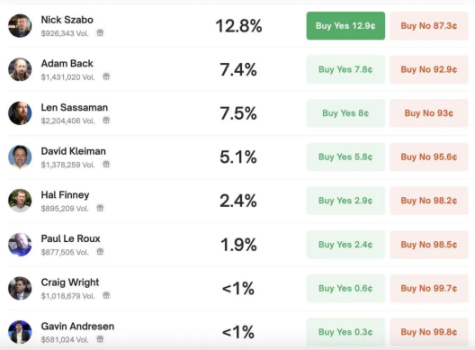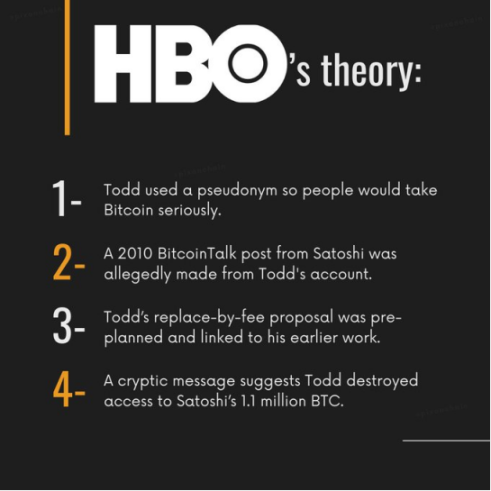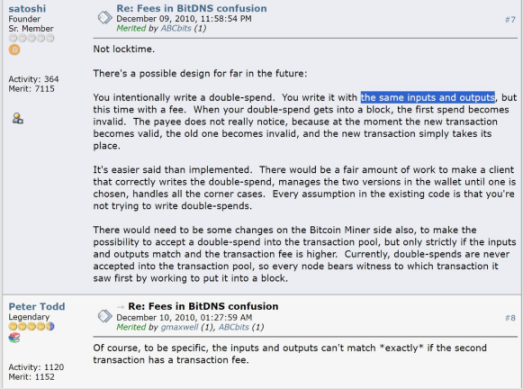A $20 million gamble, a $70 billion inference.
Written by: Tuo Luo Finance

Who is Satoshi Nakamoto?
This question has been repeatedly asked by cryptocurrency believers since the birth of Bitcoin, but the legendary Satoshi Nakamoto has never been deciphered. Even amidst a backdrop of numerous impersonators, Satoshi has remained silent, leaving Bitcoin shrouded in mystery.
However, some remain skeptical. Just last week, the famous film production company HBO released a new documentary titled "Money Electric: The Bitcoin Mystery," explicitly stating its intention to reveal Satoshi Nakamoto's true identity. The final result was that HBO's "Satoshi Nakamoto" did indeed emerge. However, the individual in question quickly refuted the claims, even stating that HBO's misidentification posed a threat to their personal safety.
In this case of mistaken identity, all that remains is an unsolvable mystery and a dormant Bitcoin wallet valued at nearly $70 billion.
On the morning of October 9, Beijing time, HBO's documentary "Money Electric: The Bitcoin Mystery" went live. In the days leading up to the release, HBO directly stated its goal to solve the greatest unsolved mystery in the crypto world—who is Satoshi Nakamoto? The credibility of HBO is undeniable; as the oldest and longest-running subscription television service network in American history, HBO not only enjoys high public recognition but also frequently wins Emmy Awards, with popular series like "Game of Thrones," "The Sopranos," and "Sex and the City" all produced by them.
The director of this documentary is Cullen Hoback, who has previously established himself as a decoding expert, having directed the documentary series "Q: Into the Storm," which investigated the Q Anon conspiracy theory and earned an Emmy nomination in 2021.
With this dual credibility, many believed HBO could reveal Satoshi Nakamoto's identity, causing a stir in the crypto community. The prediction market acted first, with real money bets opening up. Before the full release of the documentary, the betting amount had already reached over $20 million, drawing significant attention from outside observers.
From the known information, Satoshi Nakamoto is a complete enigma. All that is known is that he claims to be a Japanese-American living in Japan, born on April 5, 1975, who published a white paper titled "Bitcoin: A Peer-to-Peer Electronic Cash System" in 2008. The Bitcoin network went live in January 2009, after which Satoshi gradually faded from public view, completely disappearing from the scene after 2013.
Based on the above information, the market first selected its candidate for Satoshi Nakamoto. Initially, the top bet was placed on the obscure Len Sassaman, a cryptographer who believed in decentralization and committed suicide in 2011. Then, Adam Back, the inventor of Proof of Work, took the lead, but after Adam quickly refuted the claims, the highest bet ultimately fell on Nick Szabo.

Of course, the real money bets were not made without reason. Nick Szabo proposed a new type of currency called "bit gold" in 1998, claiming it was "completely digital and solved the double-spending problem through proof of work." This theory predates Satoshi by ten years, and in his subsequent publication "Bitcoin: The Future of Money?" his writing style is quite similar to that of Satoshi, further increasing the credibility of the Satoshi hypothesis.
However, it is worth mentioning that Nick Szabo has repeatedly denied being Satoshi Nakamoto. At this point, the popular candidates for Satoshi in the crypto community were largely covered, even including the already debunked Craig Wright. Surprisingly, HBO ultimately chose someone not on the list—Peter Todd.

This name may not be familiar to the public, but it holds some recognition among industry insiders. Peter Todd is a Canadian software developer and an early Bitcoin Core developer and cryptographic consultant. Since 2012, he has been writing code for Bitcoin, referring to himself as a "cryptographic timer" on the X platform. In April 2014, he submitted code to Bitcoin Core for the first time and subsequently proposed several Bitcoin Improvement Proposals. In 2016, he co-launched the privacy coin Zcash with Edward Snowden, gaining further recognition in the industry. Currently, Peter is also the founder of the open-source timestamp project OpenTimestamps.
From his resume, while this individual is quite capable, there seems to be no necessary connection to Satoshi Nakamoto. Why does HBO believe he is Satoshi? HBO provided corresponding evidence, such as the posting time patterns of Satoshi aligning with a student's schedule, with more posts on weekends, fitting Peter's student identity at the time. Additionally, a mysterious message indicated that Todd had destroyed Satoshi's access to 1.1 million BTC, etc. Clearly, these indirect pieces of evidence do not confirm that Satoshi is Peter Todd. However, HBO's key evidence is even more absurd.

In their argument, under a 2010 email from the early Satoshi, Peter Todd replied to the inputs and outputs mentioned, and both accounts ceased activity a few days later. Subsequently, Peter implemented the fee replacement feature discussed in that post. Therefore, HBO concluded that this was Satoshi responding incorrectly, thus Peter Todd is Satoshi.
It is evident that this argument is not rigorous enough and even seems to take things out of context. After the documentary was released, it was no surprise that the market erupted in a storm of criticism against HBO's speculative reasoning.

In fact, aside from other issues, Satoshi claims to be a Japanese-American born in 1975, already 23 years old in 2008, while Peter was still an under-23 college student at that time, having grown up in Canada. He only joined Bitcoin development in 2014, which completely contradicts this consensus characteristic. More importantly, the balance of Satoshi's wallet has remained at about 1 million coins (rumored to be 1.1 million) since 2010, with not a single Bitcoin spent. As a founder of other projects, Peter clearly has a need to access funds.
Peter Todd himself was baffled, having stated on public platforms just before the HBO documentary aired, "I am not Satoshi Nakamoto," and later claimed that the accusations from documentary producer Cullen Hoback were baseless, with all evidence being false. He merely replied to Satoshi's email and sarcastically remarked about the director of this documentary, "The director known for filming QAnon has also fallen into QAnon-style conspiracy thinking here."

In a recent interview, Peter reiterated that the director's identification was merely to create an unexpected twist to attract attention to his documentary. He expressed great concern about being caught in the "Satoshi" whirlpool. After all, a walking million Bitcoins is a huge temptation for criminals, not to mention the numerous criminal incidents targeting cryptographers to seize private keys. Although there are currently no concerns for personal safety, Pete has already begun to be disturbed, with people continuously asking him to reply with pet names to generate a new round of MEME hype, creating a rather absurd situation.
From the market's perspective, industry insiders generally expressed dissatisfaction with HBO's inference, believing it lacks genuine judgment and disrespects both Satoshi and the crypto field.
Who exactly is Satoshi Nakamoto? This question has a history of 16 years since the inception of Bitcoin. Up to now, discussions around this issue, including individual theories, organizational theories, and even national conspiracy theories, have never ceased. Recently, famous American investor Kyle Bass even stated that the Bitcoin founder Satoshi Nakamoto is actually an intelligence agency of the Chinese Communist Party. While absurd, this also reflects the demonization of this question.
It is clear that even by 2024, no one can truly answer this unsolved mystery, which means that whether Satoshi is alive or dead, this secret may have already been buried in the final grave. HBO's public decoding may not be aimed at answering the question but rather at bringing this unresolved answer back to the forefront.
However, returning to the question, whether the crypto world needs a flesh-and-blood Satoshi is also worth pondering. At the birth of Bitcoin, it coincided with the bankruptcy of Lehman Brothers, and the global monetary financial system faced a shock. Bitcoin, as a special peer-to-peer digital currency, officially opened the thorny path of decentralized belief.
Now, Bitcoin has risen from an initial price of $0.0008 to $64,000, becoming a behemoth with a market value exceeding $1.3 trillion, something Satoshi may not have even envisioned. Within this, retail investors, institutions, and believers have emerged in droves, and regardless of their motives, they have unexpectedly borne public fruit from private desires, which is not unrelated to Satoshi's invisibility. In other words, Satoshi's invisibility has allowed BTC to completely break free from the worship of individual leaders, making BTC truly a leaderless Bitcoin, the world's BTC, and further solidifying it as the absolute faith of the crypto world.
In contrast, coins with leaders, such as ETH, BNB, and DOT, inevitably face leader worship. Taking Ethereum as an example, when ETH's price stagnates, people look to Vitalik Buterin; when there are questions about the roadmap, they look to Vitalik; when development falls short of expectations, they even criticize his personal life. All of this is clearly not the state that "Satoshi" would find pleasing.
Another interesting question arises: if Satoshi is still alive, why not reveal who he is? The possible reason is that revealing oneself could lead to worse outcomes than remaining hidden. Imagine if an individual possessed such immense wealth and was the founder of the world's largest decentralized digital currency—what would the result be? Direct confrontation with regulation would be inevitable, and personal safety would certainly be hard to guarantee, leading to a high probability of a tragic end.
Ultimately, whether for the market or individuals, keeping this question mysterious is the best answer. The best suspense films always have open endings, and this ending is equally effective for Satoshi. At least for now, global crypto enthusiasts can wholeheartedly participate in this historic financial experiment, continuously building upon Satoshi's original vision. Perhaps, as the market saying goes, "No one is Satoshi, yet everyone is Satoshi."
Regardless, we should at least pay tribute to this unseen creator of cryptocurrency, just as Coinbase said when it went public, "Thank you, Satoshi, whoever you are."
免责声明:本文章仅代表作者个人观点,不代表本平台的立场和观点。本文章仅供信息分享,不构成对任何人的任何投资建议。用户与作者之间的任何争议,与本平台无关。如网页中刊载的文章或图片涉及侵权,请提供相关的权利证明和身份证明发送邮件到support@aicoin.com,本平台相关工作人员将会进行核查。




